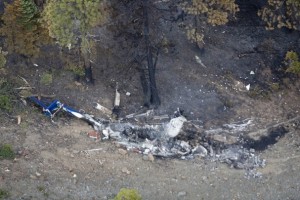Helicopter Company Disputes NTSB Crash Report
9 killed in firefighting accident in ’08
 An Oregon helicopter company blamed by federal investigators for a 2008 crash that killed nine people in the north state responded Wednesday with a letter saying the National Transportation Board botched the investigation.
An Oregon helicopter company blamed by federal investigators for a 2008 crash that killed nine people in the north state responded Wednesday with a letter saying the National Transportation Board botched the investigation.
“We have done our best to do the right thing by the families and will continue to do so as we pursue the root cause of this accident,” wrote Franklin Carson, president of Carson Helicopters. “We will not, however, stand silently by while the NTSB ignores an ongoing safety of flight issue by trying to make Carson a scapegoat.”
The NTSB last month finalized a report that said the company falsified documents detailing the helicopter’s weight, causing its pilot to miscalculate his load and crash.
The helicopter crashed Aug. 5, 2008, just after picking up a fire crew from the remote Iron 44 helipad in the Trinity Alps on the Iron Complex of fires.
The fiery crash killed seven contract firefighters onboard, a pilot from Redding there to oversee the flight crew and the pilot. The co-pilot and three firefighters survived. The helicopter crash was the deadliest in the history of the U.S. Forest Service.
“This accident was about an aircraft that was well over its weight limit,” Deborah Hersman, NTSB chairwoman said at the Dec. 7 hearing in Washington, D.C.
At the hearing the NTSB said Carson Helicopters falsified the documents in an effort to win firefighting contracts with the Forest Service.
That day Carson Helicopters responded with a brief statement saying one manager falsified one of 36 performance charts for the helicopter and that fuel system problems were the cause of the crash, not the helicopter’s weight.
Franklin Carson expanded that argument Wednesday in a six-page letter to the NTSB.
“Carson is not disputing that a Carson employee submitted incorrect information on the empty weight of the aircraft and the performance chart, but the suggestion by the NTSB that it was condoned by the company is totally false and misleading,” Franklin Carson wrote. “The idea that Carson was motivated by greed is also inaccurate.”
He said the company spent more than $4 million to modify and test the Sikorsky S-61, which originally was designed to be a submarine chaser. In the conversion of the 1965 Sikorsky helicopter to the “Fire King,” the company added a 900-gallon underbelly water tank and seats for 15 passengers.
In the letter, Franklin Carson said his company notified Sikorsky; General Electric, which built its engines; and Columbia Helicopters of Portland, Ore., which overhauled its fuel controls, that problems with a fuel filter were causing engines to lose power. But the issue wasn’t addressed until after the crash, he wrote.
Spokesmen for Sikorsky and Columbia Helicopters declined to comment on Carson’s allegations. The companies, along with General Electric, are involved in ongoing lawsuits resulting from the crash.
“GE strongly contends that the engines were not at fault in this accident,” wrote Rick Kennedy, GE spokesman in an e-mail. “Also, GE fully agrees with the findings of the National Transportation Safety Board.”
Franklin Carson said the NTSB ignored testimony from the helicopter’s co-pilot and a history of fuel system problems with the S-61 that point to an ineffective fuel filter as the cause of the crash.
He says that the NTSB was driven to put blame on his company after losing fuel system parts collected at the site and declining invitations to participate in Carson-organized flight tests of the same helicopter model. Franklin Carson said the tests show the helicopter could have handled the load it hauled when it crashed had its engines functioned properly.
Bridget Serchak, spokeswoman for the NTSB, declined to comment on the Carson letter other than to say that the NTSB put its full 175-page report about the crash onto its website, along with supporting documents.
“These materials together represent the sum of NTSB’s response and position on this investigation,” Serchak wrote in an e-mail Wednesday.
For more information: Sikorsky S-61